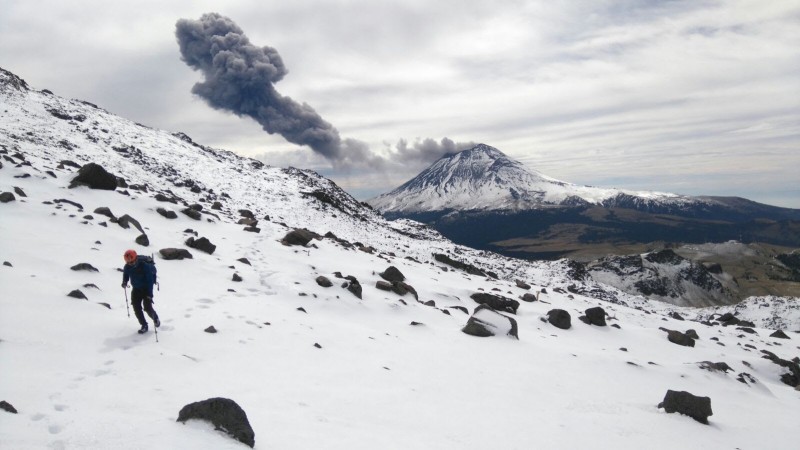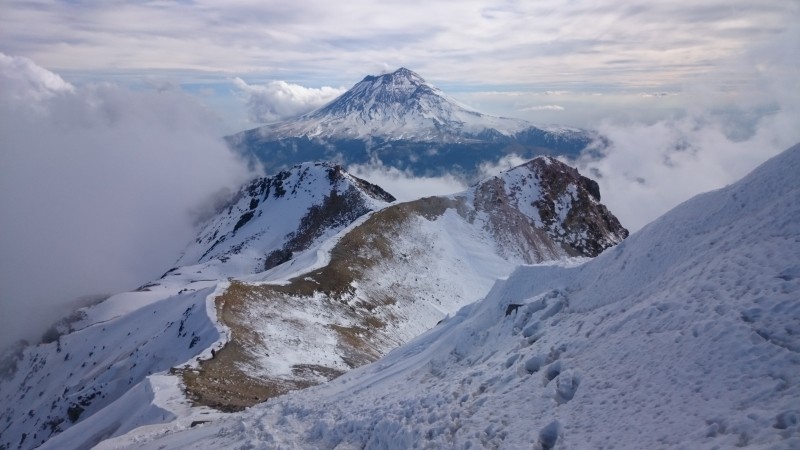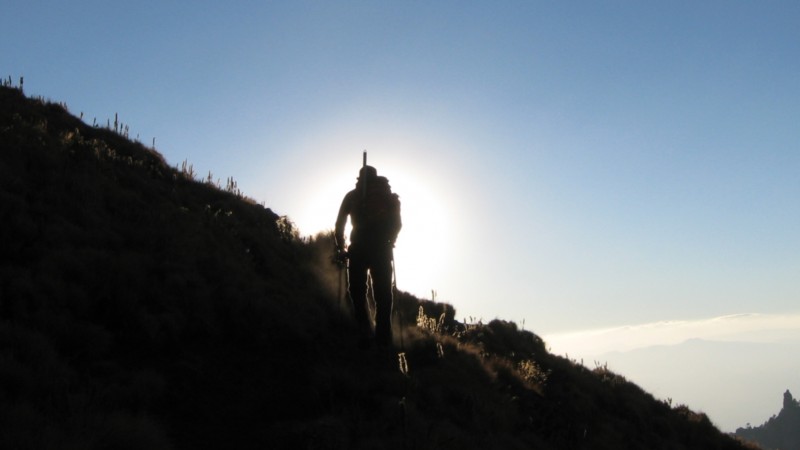
Raúl Morales climbing Iztaccíhuatl volcano, with Popocatépetl volcano in the background.
Photo used with his permission.
Mexico is a country of intense sporting activity. Companies and media focus their attentions on macho sports, usually football, and occasionally on Olympic activities with a significant involvement of Mexican competitors, such as diving or taekwondo.
Rock climbing and alpine sports, however, receive little to no coverage in traditional media, despite the fact that many Mexicans participate in these activities.
To address this imbalance, we contacted Raúl Morales, founder of Freeman, a blog dedicated all things climbing and mountaineering, from reviews of mountain routes or products to news of mountain accidents, which are often reported there before any other news outlet picks up the story. The blog even has its own film distribution division.
Global Voices (GV): So tell us, what is Freeman and how long has it been online?
Raúl Morales (RM): Freeman es un vehículo para comunicar cultura de montaña y lo más relevante sobre deportes de aventura –escalada en roca, montañismo, trail running, etcétera- en México, a través de exhibir películas sobre esos deportes en Cinépolis [el más grande exhibidor cinematográfico del país], y por medio de nuestro sitio web www.freeman.com.mx, que está en operación desde el 2014.
Raúl Morales (RM): Freeman is a means to communicate mountain culture and the most relevant information about adventure sports – rock climbing, mountaineering, trail running, etc. — in Mexico, by showing films about these sports in Cinépolis [the biggest chain of cinemas in Mexico] and on our website www.freeman.com.mx, which has been in operation since 2014.
GV: Is Freeman a community project or an independent project? Is it in any way related to the television duopoly that controls the traditional media in the country?
RM: Nuestro sitio es completamente independiente y no tiene relación con el citado duopolio. Creemos que los deportes de aventura tienen un fuerte componente de libertad y cierta rebelión personal, por lo que también intentamos vivir esa independencia hacia nuestras actividades en el sitio. Es precisamente el espíritu de aventura y de cierta emancipación al status quo lo que creemos que los deportes de aventura pueden contribuir a la búsqueda de una sociedad más armónica que en la que vivimos actualmente.
RM: Our site is completely independent and has no relation to the duopoly you mention. We think that adventure sports have a strong element of freedom and a certain personal rebellion and because of this we also try to gear this independence towards our activities with the site. We feel that adventure sports have much to contribute to the search for a more harmonious society than the one which we currently live in, namely the spirit of adventure and a certain emancipation of the status quo.
The expression television duopoly refers to the two consortia that dominate Mexican television content and are expanding their influence to other media such as radio, the press and the internet. Nevertheless, following recent legal reforms, it is hoped that another corporation will be able to enter the market.
GV: What role has Freeman played in recent accidents related to mountaineering and alpine sports in Mexico?
RM: Además de comunicar lo más objetivamente posible los hechos que han ocurrido, siempre utilizando un ángulo especializado en el deporte, también nos hemos involucrado en los trabajos de profesionalización y desarrollo de la industria relacionada a estos deportes. Actualmente somos parte de la mesa de trabajo para la actualización de la Norma Oficial Mexicana sobre turismo de aventura y también pertenecemos al grupo denominado Montañistas Unidos, creado como respuesta ciudadana a los asaltos ocurridos en julio de 2015 a más de 4,500 metros de altura en el Iztaccíhuatl.
RM: Aside from communicating the facts in the most objective manner possible, always from a sport-centric point of view, we have also become involved in efforts to professionalise and develop the industry that surrounds these sports. We are currently part of the work group for an update of the Mexican Official Standard on adventure tourism and we also belong to the group known as Montañistas Unidos [Mountaineers United], created as a civic response to the assaults that occurred in July 2015 at an altitude of over 4,500 metres on Iztaccíhuatl.

Popocatépetl seen from Iztaccíhuatl – the emblematic volcanoes of the Valley of Mexico. Photo from Freeman used with permission.
GV: What challenges does a professional mountaineer find in this country? Can Freeman help to overcome these challenges?
RM: Como deportistas, los montañistas profesionales se enfrentan a los mismos obstáculos que se viven en el resto de los deportes profesionales con las conocidas excepciones, es decir, falta de presupuesto, atención gubernamental limitada, y presencia prácticamente nula en medios de comunicación masivos, por ejemplo. Por otro lado, a pesar de que en México existe una tradición montañera de casi cien años, la cultura de montaña no ha permeado fuera de la pequeña gran familia de montañistas, escaladores, etcétera, algo que ocurre con mayor naturalidad en países donde la geografía y clima demandan conocer más sobre cómo interactuar con el viento, la nieve y la lluvia, por ejemplo, y que en México conduce frecuentemente a que exista “turismo de la nieve”, por ejemplo, o personas intentando subir el Iztaccíhuatl con zapatos de fútbol soccer y tomando cerveza.
RM: As sportspeople, professional mountaineers face the same challenges as they would in any other professional sport with the obvious exceptions, that is to say, a lack of funding, limited government attention, and practically no coverage in mass media, for example. On the other hand, despite the fact that Mexico has a tradition of mountaineering dating back nearly a century, mountain culture has not penetrated beyond the small extended family of mountaineers and climbers, a process that happens more organically in countries where the geography and climate demand a greater knowledge of how to interact with the wind, the rain and the snow, for example, and which in Mexico frequently contributes to the existence of “mountain tourism”, for example, or people trying to climb Iztaccíhuatl armed with little more than a case of beer and a pair of trainers.
GV: What are your ambitions for Freeman in the short term?
RM: Buscamos, por un lado, que el modelo de comunicación pueda ser útil para otros deportes y actividades, no solo para el montañismo, la escalada y el trail running. Creemos que la libertad de la que hablamos puede reflejarse en muchas otras actividades y Freeman puede ser también un vehículo para comunicarlas. Así, también buscamos que la cultura de montaña permee fuera del nicho que ya practica los deportes de aventura.
RM: We want, on one hand, the model of communication to be useful for other sports and activities, not only for mountaineering, climbing and trail running. We feel that the freedom that we speak of can be reflected in many other activities, and Freeman can also be a means to communicate them. In this way, we also want to extend the transmission of mountain culture beyond the niche that already practice adventure sports.
GV: Any message for Global Voices readers who are reading this from outside of Mexico?
RM: La respuesta más frecuente que he recibido al hacer preguntas similares a atletas y cineastas destacados en el medio, es que el espíritu de aventura puede formar parte de la vida de cualquiera dispuesto a enfrentar sus miedos, puede ser a través de un deporte, el arte, de poner un negocio propio o de estudiar lo que en verdad nos gusta, por ejemplo. Algo que enseñan los deportes de aventura es que, en la vida, no hay tiempo que perder.
RM: The most frequent response that I've received when asking similar questions to both athletes and filmmakers in this field, is that the spirit of adventure can be part of the life of anyone ready to face their fears, whether this is through sport, art, running your own business or studying what we truly enjoy. Something that adventure sports do teach is that in life, there is no time to lose.

Photo taken by Raúl Morales, used with permission.
In addition to the blog, you can learn more about Freeman by following @Freemanclimb on Twitter.






